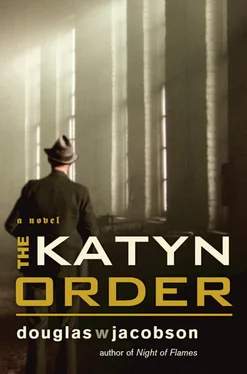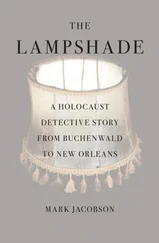By mid-afternoon, the village of Prochowa came into view, dozens of cabins clustered close together, all constructed in the Górale style of whole logs, squared and notched at the ends, high-pitched roofs and narrow windows. Men working the fields shouted greetings as they recognized Piotr. Women and children peeked out of cabin windows as the wagon creaked past and drew to a stop in the village center.
It was a grassy square, dominated on one side by a church with a high-peaked roof made of wood shingles. On the other side of the square was a large earthen area ringed with wooden benches and hand-hewn, oak tables. In the middle of the ring, large spits of meat roasted over wood fires, the smoke and tantalizing odor of mutton wafting through the village.
Within minutes the wagon was surrounded by a dozen hardy men dressed in coarse, felt trousers, leather moccasins and wide-brimmed hats. They joked with Piotr and glanced curiously at Adam. Women with long, braided hair partially covered with tasseled scarves or white head-cloths stood nearby, children peeking from behind their ankle-length, embroidered skirts.
Adam anxiously scanned the crowd, but his uncle was not among them. Should he be? What had he expected, that Banach would just suddenly appear in the middle of a crowd of mountain highlanders? He realized that he had no idea what to expect.
Piotr stood up in the wagon and held his hands in the air, silencing the crowd. He motioned for Adam to stand and addressed the group in a deep, commanding voice. “Thank you, my friends of Prochowa, for your warm welcome. Allow me to present a friend—an American—who has traveled here by way of Krakow.”
That sent a buzz through the crowd. The men glanced at one another and nodded, a ripple of applause, a few cheers. Adam’s face flushed. He waved and mumbled a few words of thanks. Then he and Piotr jumped off the wagon, surrounded immediately by well-wishers patting them on the back.
A moment later a thin, regal-looking man pushed through the crowd. He appeared to be in his sixties, with leathery skin and dark piercing eyes. He wore a short black coat over a white linen shirt and gripped an ornate, hand-carved walking stick that Adam recognized as a ciupaga, with an axe blade on the top end and steel-tipped spear point on the bottom. The group fell silent.
Piotr removed his hat, bidding good day to Casimir and said, “I bring greetings from Krystyna.”
The elderly man smiled broadly. “Ah, Krystyna, I’m told she is with child. Is she well?”
“Getting big as a house. But she can still swat me when I do something wrong.”
Casimir laughed. “Women are all the same. She’ll settle down a bit when she’s chasing after a little one.”
Piotr laid his big hand on Adam’s shoulder. “Allow me to present a fellow patriot.”
The emphasis on the word “patriot” created a flicker in Casimir’s eyes, and an unspoken communication passed between the two men. Casimir removed his wide-brimmed hat, revealing a shock of thick white hair. “Welcome to Prochowa,” he said, then raised his voice for the rest of the crowd. “We shall have a special meal this evening, in honor of our guest from America.”
Adam and Piotr spent the next few hours chopping and stacking firewood near the cooking fires, then touring the village. Adam was bursting with anxiety, barely able to concentrate, expecting that his uncle might appear at any moment, stepping out of one of the simple cottages, or perhaps sitting under a tree with a book. But he tried to be patient and not offend his hosts.
It was a small settlement, no more than thirty or forty dwellings Adam guessed, but incredibly clean and well-organized. Behind the church was a community building where women gathered to weave rugs. A horse stable stood nearby, with harnesses and saddles hung neatly on wooden pegs, the planked floor swept clean with not a trace of straw or manure outside the stalls. There were chicken coops and a turkey roost beyond and downwind from the main village area.
A blacksmith shop was located at the end of a narrow road, along with a millwork shop where several Górale men were hard at work producing shingles, planks and beautifully crafted wooden furniture. A young man in his mid-twenties stepped from behind a turning lathe, wiping his hands on a rag, which he stuffed into the back pocket of his coveralls. “I’m Zygmunt, the shop foreman,” the young man said pleasantly. “Would you care for a look around?”
For the next thirty minutes Zygmunt led Adam through his shop, explaining each piece of equipment and every tool, then proudly showed off a set of spindle-back chairs his crew had just completed. Adam shook his head in amazement. Like everything else in the tiny village, the millwork shop was efficiently operated and impeccably maintained, right down to the split-rail fence surrounding the building with not a rail or post askew. He found it hard to fathom that such neatness and order could still exist in this country so ravaged by war.
Later, as the sun was setting and the day’s work done, the crowd drifted back to the village center, exchanging good-spirited barbs with Piotr and Adam, moving en masse toward the benches and tables. An all-male crew of cooks hoisted the spits off the fires and set about carving the meat. The village women carried jugs of apple cider and beer to the tables, along with platters of goat cheese and sweet-smelling heavy, dark bread. “It’s made from oats,” one of the women told Adam, breaking off a chunk and handing it to him. “We call it chelb.”
Adam took a bite of the chewy bread, suddenly realizing he was ravenous. He glanced around, looking for Banach, but there was no sign of him. There’d also been no acknowledgement from either Piotr or Casimir of the purpose of Adam’s visit.
Plates and silverware appeared, followed by enormous platters of roast mutton, potato pancakes and steaming cauldrons of kwasnica, a sauerkraut soup that Adam remembered from his childhood days in Krakow. The noisy crowd quieted for a moment as Casimir offered a prayer, then resumed their chatter as the food was passed.
When the meal was finished, the women cleared the tables, the children disappeared and the men gathered by the fire pits with bottles of potato vodka. Glasses were filled, toasts proclaimed to the visitor from America and the potent drink downed in a single gulp.
After a second round of drinks, this one accompanied by a toast to Sleboda —Freedom—three young men moved to the center of the group with two fiddles and a goatskin bagpipe and began to play a lively mountain folk tune. Adam stood at the edge of the group, watching as several of the men joined in the singing.
After a while some of the women drifted back, and the music shifted seamlessly to something a bit slower and more rhythmic. A young woman, perhaps in her twenties, wearing a bright red-and-yellow embroidered skirt, her long blond hair woven into a waist-length braid, stepped up to Adam and took both his hands in hers. “It’s called a góralski,” she said with a bright smile. “I’m Anastazia, Zygmunt’s wife. Come and dance.”
Startled, Adam almost tripped over his feet as she quickly drew him into the center of the action. The other couples swirled effortlessly around each other in an eddy of twirling colors, touching only briefly, as the enchanting melody filled the night air. Anastazia was a good teacher, and after a few minutes he was following her lead, taking and releasing her hand, turning and bowing, right up through the grand finale when the entire group joined together in a graceful, serpentine movement Anastazia said was called the zwyrtanie.
When the dance ended, Anastazia bowed, smiled again, then hurried off to join a group of other young women, who huddled around her, giggling. Adam had the feeling she’d just won a bet.
Читать дальше












